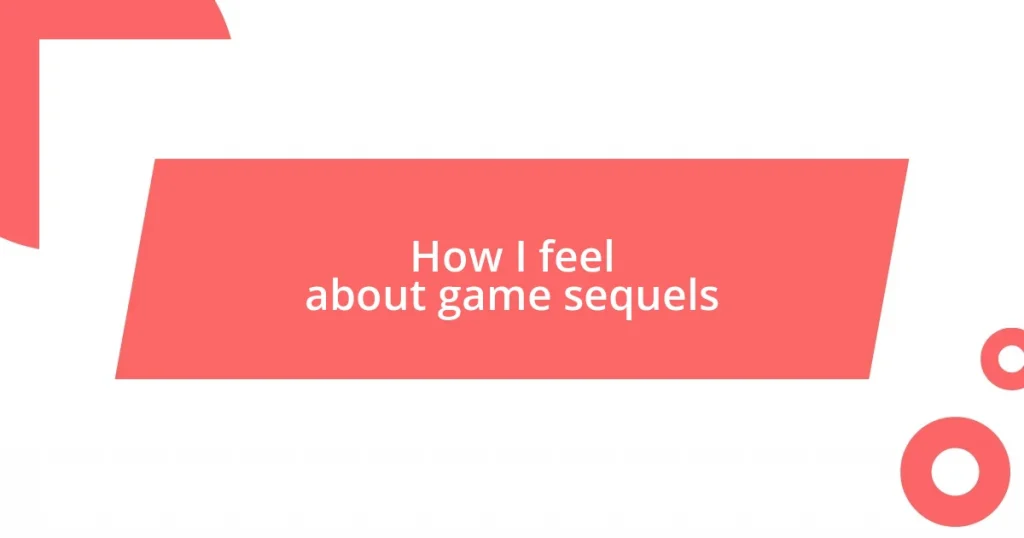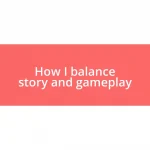Key takeaways:
- Sequels evoke nostalgia and familiarity, enhancing the gaming experience by allowing players to reconnect with beloved characters and worlds.
- Sequel fatigue occurs when games lack innovation, become predictable, or fail to meet players’ expectations, leading to disinterest and disappointment.
- Successful sequels like “The Legend of Zelda: Breath of the Wild” and “God of War” balance honoring original games while introducing fresh gameplay and deep storytelling.
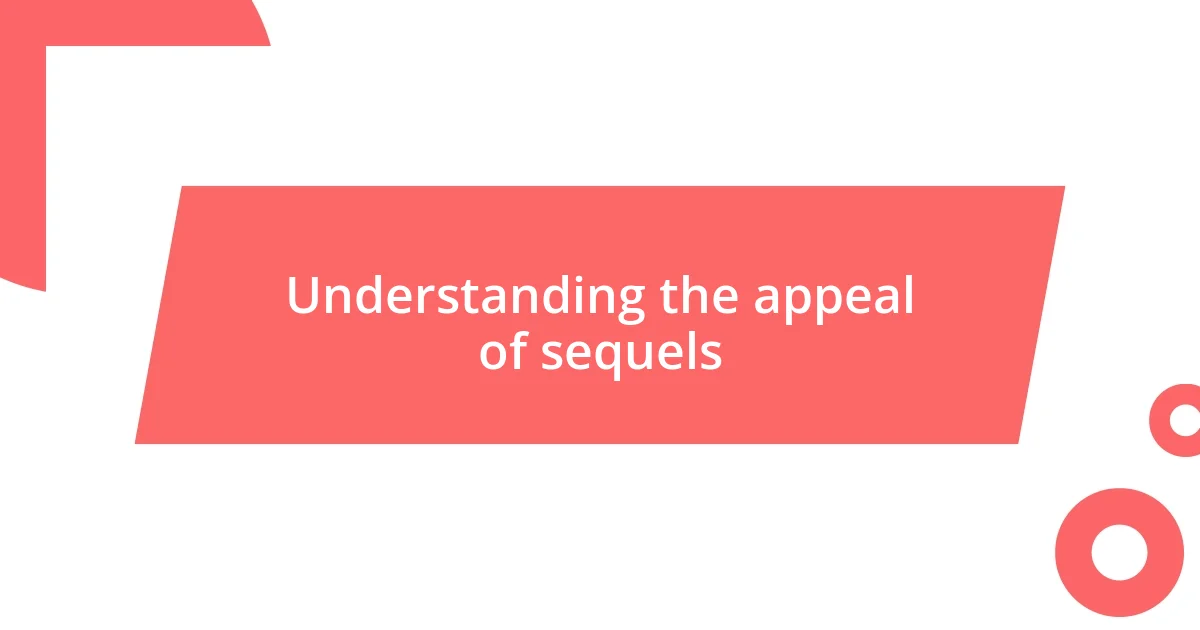
Understanding the appeal of sequels
Sequels tap into our nostalgia, allowing us to revisit characters and worlds that we’ve grown attached to over time. I remember the exhilaration I felt when I heard a beloved game was getting a sequel; it felt like reconnecting with an old friend. There’s something comforting about sliding back into a familiar universe, and it makes the experience more enjoyable because we already have a connection.
When a game sequel arrives, it often brings elevated expectations since we’ve experienced the growth of the original story. I find myself thinking, “Will this sequel live up to what I loved about the first game?” This anticipation makes the gaming experience even more thrilling, as I juggle hopes and fears about what’s to come. The idea of expanding the lore or deepening character arcs often feels like a promise of new adventures, even if it raises the stakes.
Moreover, sequels can innovate while still retaining the essence of what made the original fantastic. I think about how certain iconic franchises have evolved, blending familiar mechanics with fresh ideas. This balance can create an engaging dichotomy, enticing players like me to explore new strategies while reminiscing about the tried-and-true elements we adore. Isn’t it fascinating how sequels can both challenge and comfort us at the same time?

Reasons for sequel fatigue
Sequel fatigue is a phenomenon that many gamers experience when the excitement for new installments begins to dwindle. I can recall waiting eagerly for a sequel only to find it felt hollow compared to the original. This disconnection often stems from a lack of innovation or a struggle to recapture the magic of the first game, leaving players feeling tired and underwhelmed.
Here are a few reasons why sequel fatigue can set in:
- Predictability: If sequels follow the same formula too closely, they can lose their charm, making the gameplay feel repetitive.
- Unmet Expectations: Gamers expect depth and innovation, and when a sequel falls short, it can lead to disappointment and diminished engagement.
- Over-Saturation: With franchises continuously churning out sequels, it can create a sense of overload, where players feel they can’t keep up or simply lose interest.
- Loss of Originality: As beloved features become recycled, it may feel like the essence of the game is lost, leaving fans longing for the uniqueness that initially drew them in.
Experiencing these issues firsthand, I often find myself hesitating to dive into the next installment, wondering if it’s worth my time. The thrill of discovery becomes overshadowed by the worry of encountering yet another uninspired release, making me crave something fresh instead.
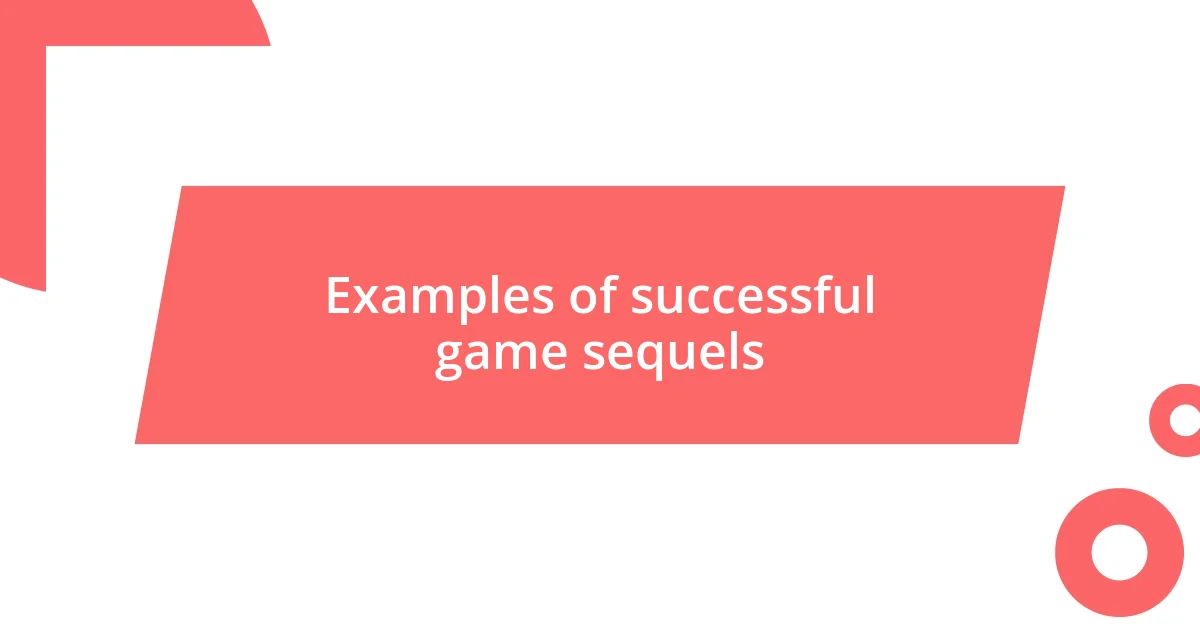
Examples of successful game sequels
When I think about successful game sequels, a few stand out in my memory. For instance, “The Legend of Zelda: Breath of the Wild” not only maintained the enchanting essence of its predecessors but also reinvented the gameplay. I fondly remember exploring the expansive Hyrule for the first time; the thrill of discovering secrets felt exhilarating. This sequel managed to honor the franchise’s roots while breathing fresh air into the series, making it a memorable experience for both longtime fans and newcomers.
Another example that comes to my mind is “God of War” (2018). It took an iconic character like Kratos and redefined his journey and growth as a father. The emotional depth and stunning visuals completely immersed me in the narrative. I never expected to feel such a strong connection to Kratos when the original was more about rage and revenge. This sequel demonstrated that sometimes it’s not just about gameplay mechanics but also about character development and storytelling.
Finally, I can’t overlook “Mass Effect 2,” which took the groundwork laid by the first game and expanded on it beautifully. The character arcs and moral choices grew in complexity, making the story feel so engaging. I still remember the sense of urgency every time I recruited a new crew member, as each one had a rich backstory and unique motivations. It’s these layers of depth that made me care deeply about the outcome of the entire trilogy.
| Game Title | Key Features |
|---|---|
| The Legend of Zelda: Breath of the Wild | Innovative open-world gameplay, exploration, and nostalgia |
| God of War (2018) | Character evolution, emotional storytelling, and stunning visuals |
| Mass Effect 2 | Complex character development, moral choices, and compelling narrative |
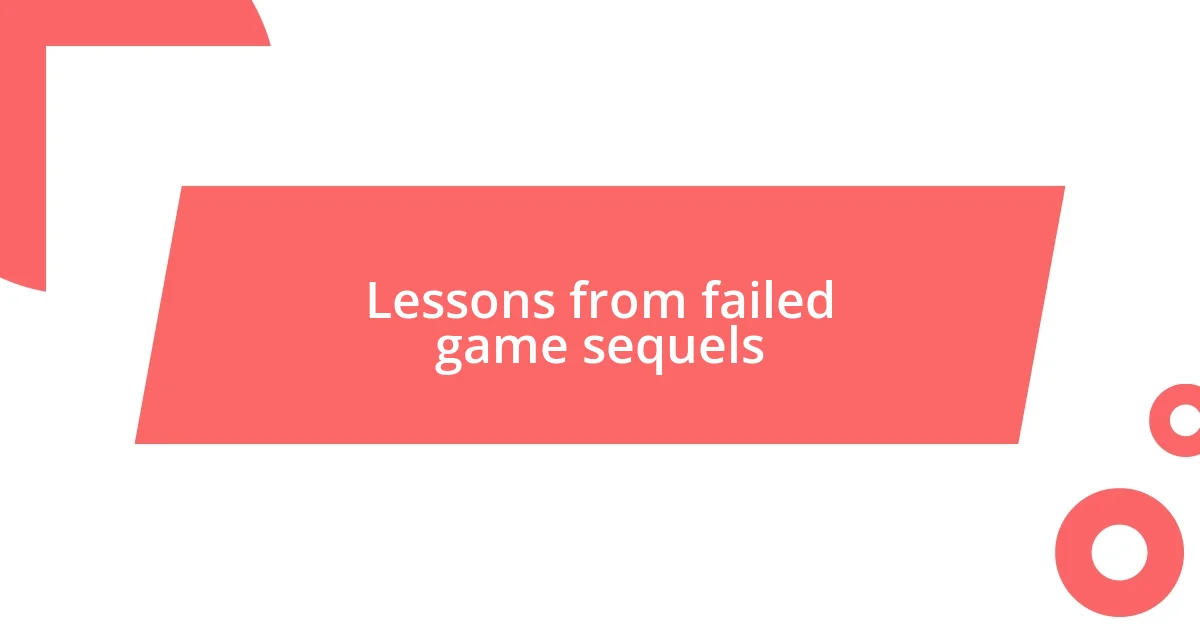
Lessons from failed game sequels
When I think about failed game sequels, I’m reminded of the disappointment that often sets in when developers miss the mark. For instance, take “Doom 3.” I watched my friends eagerly await its release, but when we finally played it, the shift to a more narrative-heavy style felt jarring. Where was the fast-paced, chaotic action that made the originals so addictive? This experience taught me that when sequels stray too far from what garnered initial excitement, they risk alienating their core audience.
Another compelling lesson came from “Assassin’s Creed III.” I had invested hours into the franchise, enamored with its rich historical contexts. However, the convoluted storylines in this sequel left many, including myself, scratching our heads. I often pondered, how does a game that started with such linearity and clear purpose veer into confusion? This really drove home the point that maintaining clarity in storytelling is crucial; players should feel guided, not lost in a web of plot threads.
Finally, I can’t overlook “Battlefield V.” I remember diving in, only to feel a disconnect with its mechanics and environments. It seemed like the essence of what made the series enjoyable had been diluted. This was a classic case of needing to honor and evolve the foundational gameplay elements, rather than throwing in drastic changes without solidifying the core experience first. I always wonder if the developers reflected on feedback from prior titles; it shows how critical it is to listen to the community to avoid repeating mistakes.

My personal experiences with sequels
I remember playing “Uncharted 2: Among Thieves” and feeling an overwhelming sense of excitement. The graphic fidelity and cinematic storytelling were jaw-dropping. It was like stepping into my own action movie, and I couldn’t help but wonder how they could top it in a sequel. Yet, when “Uncharted 3” released, I was a bit unsure. While it had its thrilling moments, the magic of the second game felt hard to replicate, which made me realize how high the bar had been set in my own expectations.
Then there’s my experience with “Halo 3.” I had spent countless nights with friends, engaging in epic multiplayer battles. The thrill of strategizing and working together was something special. When “Halo 4” was on the horizon, my heart raced; I yearned for that same camaraderie. However, upon its release, I felt a shift in the dynamics. The game was beautiful and ambitious, but something about it was different – like meeting an old friend who has changed in unforeseen ways. I found myself asking, was it me who had changed, or was it the game?
Most recently, I’ve been diving into “The Last of Us Part II.” This sequel stirred a lot of emotions in me; the raw storytelling gripped my heart. I was torn between admiration and despair as I navigated a morally complex world. I often paused the game just to reflect on the choices characters made, and I couldn’t help but wonder, can a sequel push boundaries while still connecting with its audience? It was an experience that constantly kept me on my toes, leading me to conclude that sequels are not just about repeating success; they can take us on unexpectedly profound journeys.










